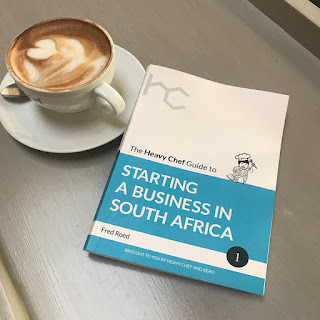The Heavy Chef Guide To Starting a Business - Internal Training Experiment (Part 4)
Welcome to Part 4 of our internal "entrepreneur training" series we're doing at forgood.
Using the Heavy Chef Guide to Starting a Business in South Africa (it's a super light read and presents quite a nice structure for the do's and don'ts of getting going in business) - we're doing bi-monthly learning sessions, discussions and exercises.
I'll chronicle them here so you can follow along.
If you missed Part 1, Part 2 and Part 3 - go give them a read. If you're wondering why we're training our team to be entrepreneurs? Why not?
This is a shorter post. The advice in these chapters is simple and practical. Hopefully I can reinforce a few themes...
Raising funds.
This subject is talked about the most and often accused of being the single biggest barrier to entrepreneurship in South Africa. It is - and it isn't. I only have a few rules to think through when raising funds.
1. Get paying customers first. Before raising funds.
2. Try every fundraising angle. Twice. It's a grit game. There are some incredible grants/programmes that just require sheer bloody minded repetition and obstinance to get into.
3. Be careful of taking bad money.
Bad money is a tricky concept, because every entrepreneur hits the stage where any money is good money - but a bad investor can be as distracting and damaging as no investor. It sounds counterintuitive, but much of this game is.
Hiring a Team
This chapter has a useful list of characteristics to look for in startup hires. They are different. A corporate lifer in a startup is a very dangerous (and expensive) proposition - especially in the early stage.
Make sure any early stage hires:
Staff churn will happen, don't let it get you down. Many people are attracted to the "rock star" media coverage of startups, only to get a rude awakening when they're actually in one.
A quick trick I'd like to share to aspiring entrepreneurs creating jobs: find a way to filter CVs up front.
There is a horrible trend in South Africa (and likely the world) of spray-and-pray job seeking. This gets my goat because it puts the burden of administration on the person creating the job, not the applicant.
To get around this, I specifically instruct people not to send their CV in the job ad, rather submit the answers to some carefully chosen questions. Or even to do a particular task. This isn't a new trick (see the Google job ad below), but it allows you to simply delete any applicants that don't follow the instructions. That's more than 80% of applicants in my experience.
What's left is usually more interesting.
The role of BBBEE in South African Startups
This is a complex and multi-layered issue that deserves a series of posts all by itself. Here's one theme I'd like you to think through.
Privileged white founders (say, over the age of 30) will typically have white networks. Which will lead, often through no malice or intent, to white dominant teams. If you want diversity, you need to break that cycle and actively seek a balanced team.
The rewards for doing so are significant.
Using the Heavy Chef Guide to Starting a Business in South Africa (it's a super light read and presents quite a nice structure for the do's and don'ts of getting going in business) - we're doing bi-monthly learning sessions, discussions and exercises.
I'll chronicle them here so you can follow along.
If you missed Part 1, Part 2 and Part 3 - go give them a read. If you're wondering why we're training our team to be entrepreneurs? Why not?
Chapter 5 and 6
This is a shorter post. The advice in these chapters is simple and practical. Hopefully I can reinforce a few themes...
Raising funds.
This subject is talked about the most and often accused of being the single biggest barrier to entrepreneurship in South Africa. It is - and it isn't. I only have a few rules to think through when raising funds.
1. Get paying customers first. Before raising funds.
2. Try every fundraising angle. Twice. It's a grit game. There are some incredible grants/programmes that just require sheer bloody minded repetition and obstinance to get into.
3. Be careful of taking bad money.
Bad money is a tricky concept, because every entrepreneur hits the stage where any money is good money - but a bad investor can be as distracting and damaging as no investor. It sounds counterintuitive, but much of this game is.
Hiring a Team
This chapter has a useful list of characteristics to look for in startup hires. They are different. A corporate lifer in a startup is a very dangerous (and expensive) proposition - especially in the early stage.
Make sure any early stage hires:
- share your vision
- are curious
- are hands-on / can execute
- are partners
- are a perfect culture fit (I added this one in)
Staff churn will happen, don't let it get you down. Many people are attracted to the "rock star" media coverage of startups, only to get a rude awakening when they're actually in one.
A quick trick I'd like to share to aspiring entrepreneurs creating jobs: find a way to filter CVs up front.
There is a horrible trend in South Africa (and likely the world) of spray-and-pray job seeking. This gets my goat because it puts the burden of administration on the person creating the job, not the applicant.
To get around this, I specifically instruct people not to send their CV in the job ad, rather submit the answers to some carefully chosen questions. Or even to do a particular task. This isn't a new trick (see the Google job ad below), but it allows you to simply delete any applicants that don't follow the instructions. That's more than 80% of applicants in my experience.
What's left is usually more interesting.
The role of BBBEE in South African Startups
This is a complex and multi-layered issue that deserves a series of posts all by itself. Here's one theme I'd like you to think through.
Privileged white founders (say, over the age of 30) will typically have white networks. Which will lead, often through no malice or intent, to white dominant teams. If you want diversity, you need to break that cycle and actively seek a balanced team.
The rewards for doing so are significant.




Comments
Post a Comment